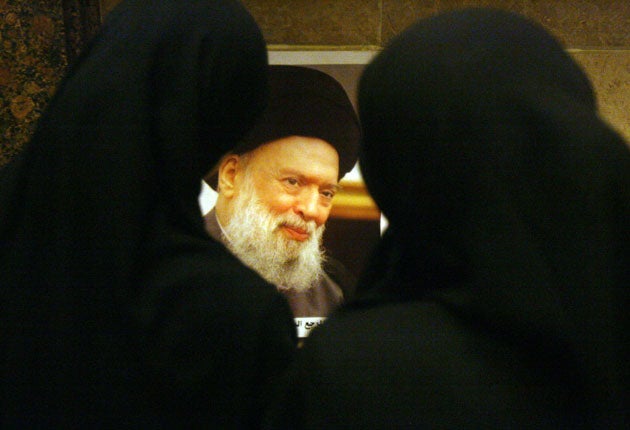Spiritual leader to Hizbollah dies condemning Israel

Your support helps us to tell the story
From reproductive rights to climate change to Big Tech, The Independent is on the ground when the story is developing. Whether it's investigating the financials of Elon Musk's pro-Trump PAC or producing our latest documentary, 'The A Word', which shines a light on the American women fighting for reproductive rights, we know how important it is to parse out the facts from the messaging.
At such a critical moment in US history, we need reporters on the ground. Your donation allows us to keep sending journalists to speak to both sides of the story.
The Independent is trusted by Americans across the entire political spectrum. And unlike many other quality news outlets, we choose not to lock Americans out of our reporting and analysis with paywalls. We believe quality journalism should be available to everyone, paid for by those who can afford it.
Your support makes all the difference.Lebanon's Grand Ayatollah Sayyed Mohammed Hussein Fadlallah, one of Shia Islam's highest religious authorities and an early mentor of the militant group Hizbollah, died in a Beirut hospital yesterday.
Ayatollah Fadlallah, who was 74, had a wide following beyond Lebanon's Shia, extending to central Asia and the Gulf. He had been too frail to deliver his regular sermon at Friday prayers for several weeks, and had been in hospital since Friday suffering from internal bleeding.
Crowds gathered at his Hassanein mosque in southern Beirut to pay condolences, and Hizbollah said it would mark his death with three days of mourning.
Black banners hung outside mosques in Shia areas of southern Lebanon and the eastern Beqaa valley, as well as at Ayatollah Fadlallah's many charitable institutions. "He was a guide not just for Lebanon but for the whole world and for Muslims," said a mourner, Abu Muhammed Hamadeh, outside the Hassanein mosque. "With his death, he has left a very large void in the Arab and Muslim world."
Ayatollah Fadlallah was a supporter of Iran's Islamic revolution and the spiritual leader and mentor of the Shia guerrilla group Hizbollah when it was formed after Israel invaded Lebanon in 1982, though he later distanced himself from its ties with Iran.
Hizbollah's al-Manar television interrupted its programmes and showed a picture of the white-bearded, black-turbanned cleric. "He stood with great courage and clarity as a supporter of the resistance against the Zionist enemy and of the heroic mujahedin," Hizbollah said.
A fierce critic of the United States, which formally designated him a terrorist, Ayatollah Fadlallah used many of his Friday sermons to denounce US policies in the Middle East, particularly its alliance with Israel.
But he was also quick to denounce the September 11, 2001 attacks on the US, which killed some 3,000 people.
Ayatollah Fadlallah survived several assassination attempts, including a 1985 car bomb which killed 80 people in south Beirut. US news reports said the attack was carried out by a US-trained Lebanese unit after attacks on US targets in Lebanon.
He was known in Shia religious circles for his moderate social views, especially on women. He issued several notable fatwas, or religious opinions, including banning the Shia practice of shedding blood during the mourning ritual of Ashura. Lebanon's prime minister, Saad al-Hariri, a Sunni Muslim, said Ayatollah Fadlallah "contributed to the consolidation of the values of right and justice to resist injustice".
Ayatollah Fadlallah was born in 1935 in the Iraqi Shia city of Najaf, where he studied before moving to Lebanon in 1966.
In his final sermon, delivered by a deputy on Friday, he condemned Israeli settlements in East Jerusalem and criticised the US for "giving cover to the enemy (Israel)".
A doctor at the Bahman hospital, to which he was admitted on Friday, said that when a nurse asked the cleric what he needed, he replied: "For the Zionist entity to cease to exist."
Join our commenting forum
Join thought-provoking conversations, follow other Independent readers and see their replies
Comments